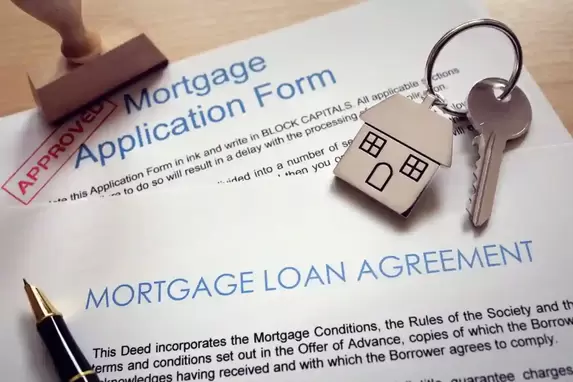|
Money & Finance
|
How to choose a mortgage
|
If you’re new to the mortgage market, it can seem a complex and confusing place.
Even if you’ve been here before, the chances are things have changed since you last looked around. Here’s a backgrounder on what you need to know and what you should think about before plunging in and signing up with a product. After all, getting things wrong can be a very expensive mistake indeed. Loans by their nature have to be paid back. And that’s what you do, slowly, with a capital repayments mortgage. Recently, the last couple of years, the market has seen the reintroduction of interest-only loans. With these you don’t pay off the debt at all, only the interest on the loan, which makes the repayments cheaper. But, at the end of a capital repayment loan, you owe nothing. At the end of the term of an interest-only loan, you still owe the entire sum you borrowed. To pay it back, you’re either going to have to sell your property (taking any profit), or remortgage and pay the loan off with a new one. |
|
|
However, interest-only mortgages, which can work well in a rapidly rising property market, are generally now only available to wealthier, lower-risk borrowers.
If you’re in the mainstream, your option is really a capital repayment loan. Two types of loan There are many, may different types of mortgage products on the market, but, for the most part, they all fall into two basic types of loan. A lot like the way you pay your energy provider, you can either pay a Variable rate of interest or you can pay off the loan at a fixed rate of interest. There is no answer to the question: which one is best? And the reason for that is they both have pros and cons and these depend on not only your personal circumstances, but also what is going to happen to interest rates in the future. And, whatever any expert tells you, no-one gets this right every time. The old saying is worth repeating: anyone who says they know what will happen in the future is either a liar or a fool. So, with this in mind … |
|
|
Fixed-rate loans
Just as you can take out a fixed tariff with your energy supplier, so you can fix the rate at which you pay back your loan to your lender. This will be a fixed rate of interest for a fixed period, after which you’ll either have to revert to a variable rate (see below), or take out another deal at a fixed rate. Terms can vary from one, two, three, and five years, or even longer in rarer cases. Pros With a fixed-rate mortgage, the big advantage for most people is avoiding shocks, both a financial shock when interest rates suddenly go up sharply and your mortgage payments with them, and the kind of shock your health undergoes when this happens! You can plan ahead, knowing what your outgoings will be for a set period. This is a massive plus, especially when dealing with the large sums of money that mortgage usually involve managing. Cons For this peace of mind, you’ll often have to pay a premium, a little more than the generally available rate on the market. The bank or building society fixes a rate which it feels will still allow it to make money over the period of the fix. So, it anticipates that variable rates will not exceed your fixed rate over the period of the fix. If this sounds a bit like a punt, well it is. But not on your part. The bottom line is that if you fix, you may miss out on lower interest rates available on the market during the period of the fix. This is because, once you sign up to a rate and a period of time, it will be very expensive, usually, to get out of the contract. This fee is known as an “early redemption charge” and you should always check what it amounts to. This degree of uncertainty usually means borrowers don’t like to fix their interest rate for longer than a few years, or they could overpay by huge amounts. Then again, some borrowers will happily look at interest rates over a long sweep of years and take an educated gamble on when and at what rate they’ll peak in the future, then fix for a much longer period. For most borrowers, somewhere in the middle – a fix of two, three or five years (at most), is probably wisest. Variable-rate loans The alternative to a fixed-rate mortgage is a variable. Pros These can work out cheaper on a month-by-month basis. Cons….but the degree of certainty about what you pay has gone. They do what they say on the tin – they vary. Variable-rates will generally move in line with the Bank of England’s Base Rate, but not necessarily by the same amount as the Base Rate moves. Different lenders will compete for your business and what rate you are offered may change depending on your individual circumstances, such things as how much relative to the worth of a property you are borrowing, over how long and what kind of risk you are seen to be. Your risk profile will vary somewhat according to your credit history and the kind of job you have, how much you earn relative to what you’ll be paying each month and so on. However, lenders usually set aside risk by limiting the amount they’ll lend you relative to how much a property is worth. This is known as the Loan To Value ratio (LTV). When the property market outlook is good and rising, lenders generally will lend higher LTVs because they are reasonably confident of getting their money back if you default on your loan and they have to seize and sell your property. Types of variable-rate mortgages Variables come in various types, none more obviously better than the other. You’ll have to make your own call about which suits you best, or which you’re most comfortable with. Trackers These have been extremely popular as they simply track the Bank of England’s Base Rate, with an added percentage on top. So they move by a fixed amount as the Base Rate moves. So, if your tracker is fixed at, say, 1.5% above Base Rate, you’ll pay 2% if the Base Rate stands at 0.5%. Trackers can be excellent value when the Base Rate is super low, as it has been now for almost ten years. These terms are available over different time periods and are often quite flexible, so you can end the arrangement without paying a hefty fee. Obviously, if base interest rates are set to rise fast, as, say, inflation builds in the economy, a tracker is perhaps going to appear less appealing. Standard variable rates Just as with energy tariffs, you want to avoid these as they will usually mean you’re paying more than you need to. The rate will fluctuate as the lender decides. The only main advantage is that you can leave anytime. The standard variable rate (SVR) is what you will revert to once a fixed or tracker deal ends. Discounts This is a discount off the lender’s SVR (above). So it will move, like a tracker, but it tracks the lender’s SVR, rather than the Base Rate and the rate undercuts the SVR. Sort of the opposite of a tracker then. |
|
|
Bear in mind though, that you should look at the actual rate you’ll pay when making comparisons, NOT the size of the discount on offer.
Why? Because lenders’ SVRs vary. Discounts can help keep repayments down, especially in a competitive market in which lenders are tending to cut rates to attract business. On the other hand, you might be getting a discount, but it’s only relative to the lender’s SVR, which they can change anytime. Most deals will also have early exit fees. Capped loans These are loans that track the lender’s SVR but they also have a maximum rate they will not rise above. This means that at any time during the period of the deal, you know the worst-case scenario in terms of monthly payments. But make sure you understand what you’ll be paying every month if the rate does reach the cap – which can be pretty high – can you afford it? Offset mortgages These are a little more complicated and only work for those who have some savings. They offset your savings (which you have deposited with the lender), and sometimes money in your current account, against what you owe in total, so you only pay interest on the difference. Although you will only be charged interest on the difference between your savings and the loan, your payments will often be based on the total amount borrowed. Effectively you’ll be overpaying and so the loan will be paid of more quickly. To many borrowers, overpaying and settling the debt quickly may not be the best option, especially when interest rates are historically low. Borrowing money via a mortgage is often the cheapest kind of loan you will ever find. These loans, however, account for only a tiny part of the overall mortgage market and often come with a relatively high repayment interest rate. Plus, you are tied to having savings with your lender, which may not be the best place for them. What to be careful of and what to check when getting a mortgage There are lots of pitfalls in the mortgage market for the unwary or those lacking knowledge. Here are some key things to check and to watch out for. Deposit Just as important as the monthly repayments is the amount of money you’ll need to put down as a deposit on a property – basically the percentage you’re going to buy outright. The lender will stipulate this. In the past, this was the cause of a lot of problems because many lenders were happy to hand over loans for 100% of a property, even 110% in some cases. When property prices fell, mortgagees were left in negative equity – meaning the price they could sell their property for would not cover what they owed, so they couldn’t move. |
|
|
Or when interest rates went up, borrowers struggled to meet their monthly payments and risked their home being repossessed.
As a result, lenders are now much more strict on deciding who they will lend to and how much they will lend. Generally speaking, the bigger proportion of the property’s price you can put down initially, the better deal you’ll get from a lender. But at the very least, you’ll need 10%. Project ahead Always project ahead and see how your repayments will look at different levels of interest rates. At what level would you really struggle to make the payments? This is basic stress testing and no one should rely on lenders alone to do this on your behalf. Do the maths and find out where you stand. Fees Fees lurk everywhere in the mortgage market. Arrangement fees, management fees, valuation fees and application fees. The list goes on. And they can often form a substantial part of the initial cost of your mortgage. This can be a big hit, especially for first-time buyers. So, ensure you have a complete breakdown of all cost associated with the mortgage. Be especially wary of fees expressed as percentages as these can add a lot of money to your set-up bill. Most of the time, a flat fee will be better value and is the preferred option. Exit fees Not all fees are encountered at the mortgage set up stage. Be careful of exit fees that you may encounter when you come to remortgage. These are charges to carry out the admin of winding up your mortgage when you come to remortgage. They will vary, but make sure they are spelled out and you are aware of them. Survey fees Most lenders will insist on you using a surveyor and charges of their choice to value the property you want to buy. Remember, a lender may decide to lend you, say, 80% of a property’s value - but that is what THEY value it at, which may not be the same as the amount you have agreed to buy it at. This is known as ‘valuing down.’ Legal fees Not strictly speaking in the realm of mortgages, but if you are remortgaging there may be some lenders’ deals that include ‘free’ legal work. Of course, the cost is in there somewhere, but even so, this can be attractive. Early Redemption Charges You’ll almost certainly be charged a penalty if you pull out of a fixed term deal, so make sure you know what the charge will be, just in case you have to do this. A Spokesman Said's mortgage summary: Ask yourself: * Do you want the certainty of a Fixed or the potential savings of a Variable? * If Variable, what kind? * If fixed, for how long? * What are all the penalty charges potentially involved? * What are all the set up fees involved? * How much can you afford to put down as a deposit to reduce your repayments? Happy house hunting! The information on this page is intended for editorial purposes only and not intended as a recommendation or financial advice. |
|


